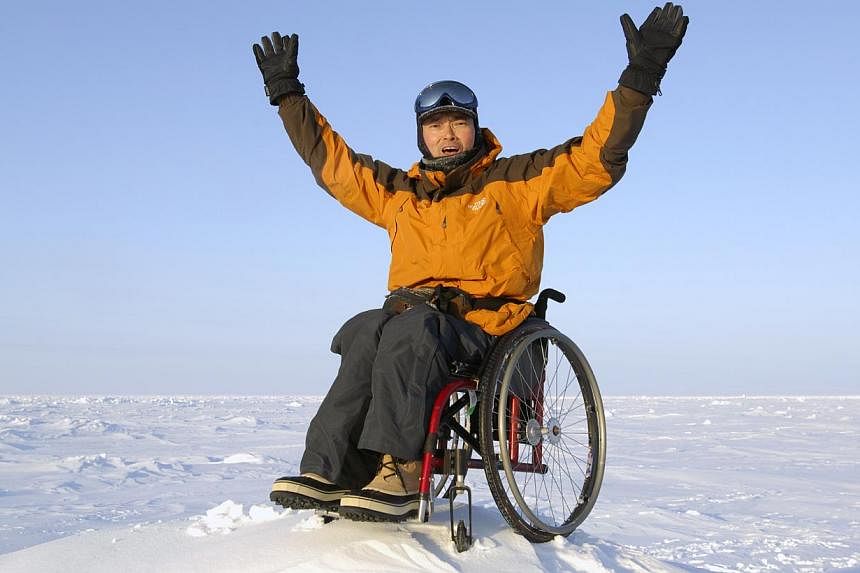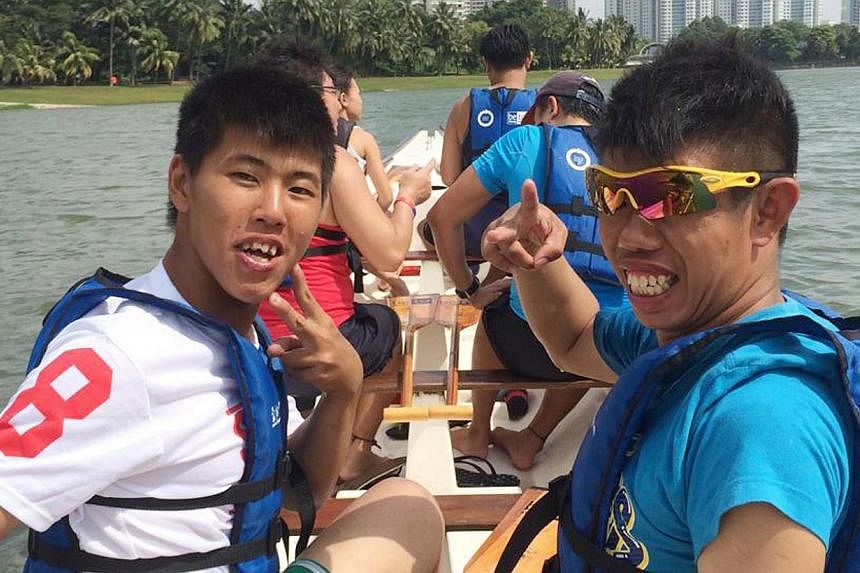People with disabilities are taking part in mainstream sports as well as getting involved in extreme or unusual activities such as ultramarathons, short-track speed skating and dragon boating.
These activities are either pursued long term, short term or as one-off experiences. Sometimes, the disabled participants are pitted against the able-bodied.
Paralympic athlete William Tan, 58, says that the Table Tennis Association for the Disabled (Singapore) had just six players in 2012, but has more than 30 now.
Mrs Liza Ow, principal of the Association For Persons With Special Needs Tanglin School, says annual sports events and competitions organised by the Singapore Disability Sports Council and Special Olympics Singapore are usually well represented by athletes from the association's schools.
These developments are a result of increased awareness about disability sports and better access to sports facilities.
Ms Stefanie Pitchian, corporate communications executive at the Singapore Disability Sports Council, says the council has been doing more to educate the public about disability sports through road shows at public, corporate and school events.
It offers 18 sports, including handcycling, wheelchair basketball and athletics. It recently added powerlifting and goalball to the list.
Sports serves as a form of rehabilitation for disabled people, says Ms Pitchian. "Sports also adds value to their lives as it improves their social skills and self-confidence."
Adds Mr Abhimanyau Pal, executive director of SPD, an organisation representing the disabled: "Sports also creates opportunities for social and community integration. We hope there will be greater opportunities to integrate people with disabilities into mainstream sports."
Then there are some disabled athletes who push themselves further by engaging in extreme sports. They include Dr Tan, mountaineer David Lim, 50, who is partially disabled in both legs from Guillain-Barre Syndrome, and para-athlete "Blade Runner" Shariff Abdullah, who was born without a left foot and tackles marathons with a prosthetic leg.
Dr Tan says there are only a handful of such athletes here because extreme endeavours require a significant amount of time, funding, effort and training.
"Moreover, for such athletes, organisers of extreme sports events may not be willing to accept their entries as they are concerned about liabilities," he says.
Case in point? He says he has been advocating for disabled athletes to participate in the Standard Chartered Marathon Singapore, but to no avail. Other obstacles he cites include the lack of training venues - no mountains, no uninterrupted stretches of traffic-free roads. Some hurdles also lie with the individuals themselves, which include a fear of failure and danger.
Mr Lim adds that the level of support that overseas disabled athletes receive to acquire aids such as advanced prosthetics is higher than what is offered here.
"You can't go jumping, running and climbing with a lot of the basic devices and the advanced ones are expensive," he explains.
But while the number of such athletes is low, their feats have been remarkable.
Dr Tan completed his first marathon in 1980 in a borrowed hospital wheelchair and has since taken part in more than 120 marathons in various continents. He is also the first man in the world to complete the North Pole Marathon and the Antarctica Marathon in a wheelchair and is training for the Boston Marathon later this month.
Mr Lim was the first mobility-impaired person to climb Mount Kinabalu in a day in 2013. His right leg does not work below the knee and the nerves activating his left calf and other smaller muscle groups are permanently damaged.
"Impossible is just an opinion, not a fact. We can always change opinions," he says.
One able-bodied person who has been trying to change perceptions of the sports disabled people can or cannot do is Mr Ryan Ng, 24.
In 2012, the keen dragon boater roped in three other trainers and set up Deaf Dragons, a dragon boat team with some deaf members. As a result of his efforts, at least 60 hearing-impaired people have tried the sport.
This year, Mr Ng, who runs a social enterprise, opened up Deaf Dragons to those with other disabilities.
"I want Deaf Dragons to be a team where inclusion can be found," he says.
His brother Jarran, who has a mild intellectual disability, is one of those who have tried the sport. The 19-year-old and his friend, Lee Wei Keong, 20, are students at the Association For Persons With Special Needs Delta Senior School.
Since the start of this year, they have been training with Deaf Dragons and say they have learnt coordination, teamwork and perseverance even when they are physically tired from paddling.
Says Mr Lee, who also has a mild intellectual disability: "Through being a part of this team, I get to interact with those of other disabilities. I've been learning sign language from my hearing-impaired teammates. They are my new friends."
Speed skating champ
Phil Anthony Labramonte Razo, 15, was introduced to ice-skating in 2012.
With just a year of training, he won gold for Singapore at the 2013 Special Olympics World Winter Games in South Korea for short-track speed skating, which is done on ice.
Before 2012, the then 14-year-old, who has a mild intellectual disability, had not ice-skated or rollerbladed before.
Yet when Special Olympics Singapore's organising committee contacted the Association For Persons With Special Needs Tanglin School, where he studies, to gather a group of students to try out for short-track speed skating, he was one of those selected.
Mr Kenneth Lai, the school's head of department for Physical Education & Sports, says: "Phil is a natural athlete. From the time I knew him in Secondary 1, he has excelled in every sport he has tried out, be it soccer or badminton."
Phil was able to balance and move about on the skates quite quickly, although it took him some time to learn to go fast. He did well during the trial sessions and was one of five selected from a group of about 30 hopefuls to train under Singapore speed skating captain Lucas Ng for the 2013 Special Olympics World Winter Games.
Because they were given only between 7 and 9am on Saturdays to train at Singapore's only Olympic-sized iceskating rink at JCube, Phil would wake up at 5am and leave his family's rented four-room flat in Sin Ming by 6am for the hour-long journey to Jurong East.
His father is an engineer and his mother works as a cafe assistant.
The youngest of three siblings recalls with glee: "Waking up early was tiring, but I really enjoyed my time skating. I grew more confident as the days went by and could skate faster and faster. At times, I felt like I was flying."
He says skating is challenging and exciting because it is about having quick thinking, strategy, balance, coordination and guts all at the same time.
"You have to make sure others don't cut in and get ahead, while at the same time maintaining your own lead," he says.
For the 2013 Special Olympics World Winter Games, he competed in three events - the 111, 222, and 333m races. He won the gold for the 333m event.
"I didn't do well for the earlier, shorter events because I was not used to the ice. It was very different from the ice we trained on in Singapore," he says.
But by the time he got to the 333m event, he had grown accustomed to the ground.
"I'm very proud to have won a gold for Singapore. I had no expectations. I was just happy to represent the country," he says.
A few months later, he won a silver medal at the inaugural International Skating Union World Development Trophy, which saw more than 40 top young skaters from nine countries showcasing their skills in short-track speed skating.
"I had the skill to win and I competed fairly without pushing anyone because I know that would get me disqualified," he says.
He has hung up his skates for now as it remains to be seen if there will be a team of speed skaters sent to compete in the next Winter Games, which will be held in 2017.
It is also difficult for him to pursue it as a recreational activity as it is expensive and inconvenient for him to travel to the nearest skating rink.
"I hope I get to compete again. I love skating," he says with a grin.




